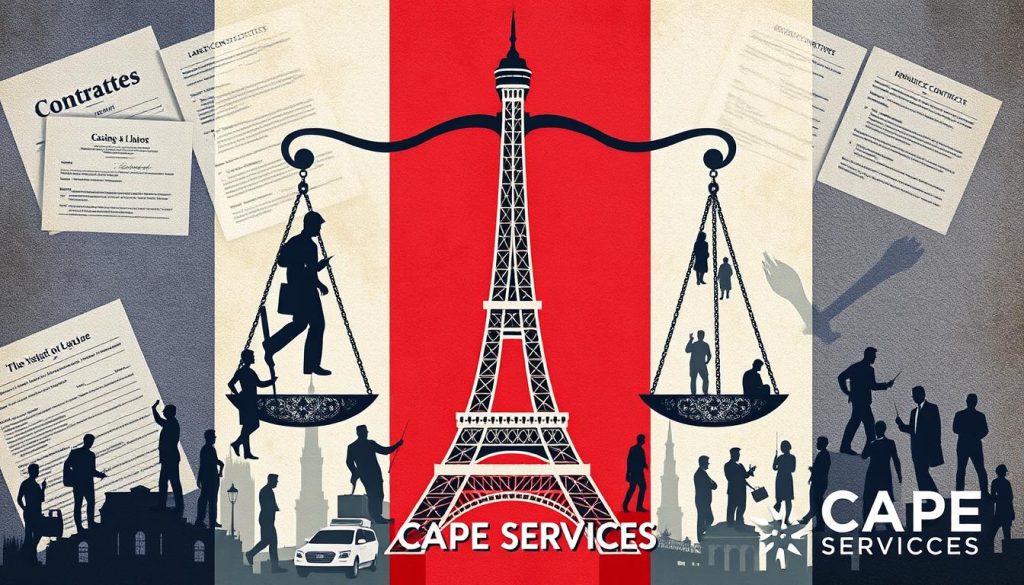If you’re a foreign company eyeing the French market, knowing the legal and tax rules is key. France’s corporate income tax hits profits made in France and income from French sources1. Our guide will walk you through the essential steps and considerations. This includes the various business structures and the tax side of things, vital for any foreign company in France.
Table of Contents
Introduction to the French Market
France has clear rules for foreign investment, set by the French Ministry of the Economy2. With over 28,000 foreign-owned firms, France is a big draw for international businesses3. In 2018, it was the ninth biggest market for foreign investment, seeing a 2% rise3.
Key Takeaways
- Knowing the legal and tax rules is crucial for foreign companies in France and international businesses in France.
- France’s corporate income tax applies to profits allocable to a French business and on French-source income1.
- Foreign direct investment (FDI) guidelines on French foreign direct investment control were published by the French Ministry of the Economy’s General Treasury Department on September 8, 20222.
- France is home to more than 28,000 foreign-owned companies, and in 2018, France was the ninth largest global market for foreign direct investment (FDI) inflows, with a year-on-year increase of 2%3.
- Foreign companies in France and international businesses in France can benefit from the country’s attractive business environment.
- It is essential to consider the tax implications of doing business in France, including the corporate income tax and value-added tax (VAT)1.
- France’s simplified joint-stock companies (SAS) are widely used due to their flexibility and are subject to corporate income tax1.
Overview of France’s Business Environment
France is known for its pro-business atmosphere. It has a well-developed financial market and a highly skilled workforce. The economy is strong, with a big service sector, a large industrial base, and a growing tech sector. This makes it great for overseas corporations in France to thrive.
The legal system in France is based on civil law. It clearly separates public and private laws. This setup offers a stable and predictable space for foreign investments in France. France is the third-largest economy in Europe and the sixth largest globally in terms of GDP4. Knowing the economy and laws is key for foreign companies in France.
Economic Landscape
The French economy has grown a lot in recent years. It focuses on innovation and technology. Many foreign investments in France have come in, mainly in IT and manufacturing. In 2022, the trade between the U.S. and France in goods and services was $153.8 billion, a 32% jump from the year before4.
Regulatory Framework
The French laws support businesses with incentives and tax breaks for overseas corporations in France. The country has a well-developed financial system. This makes France a top choice for foreign investments in France, with many companies setting up there5.
France is a great mix of economic stability, innovation, and business-friendly laws. It’s perfect for overseas corporations in France and foreign investments in France.
Benefits of Setting Up in France
France is a great place for multinational and foreign-owned companies to set up in Europe. It has a strategic location, making it a perfect entry point to the European market. This allows companies to reach a huge number of consumers6.
The country also boasts a skilled workforce, innovative leaders, and top-notch transportation. These factors make France very appealing to foreign companies7.
Some of the main advantages of starting a business in France include:
- Access to the EU market, with a domestic consumer population of 67.3 million7
- A skilled workforce, with about 10% of the French population from racial or ethnic minorities7
- A favorable business environment, with a corporate income tax rate of 28.4%7
France also has a well-developed telecommunications and technology infrastructure. This makes it perfect for businesses wanting to be in Europe6. With its talented people, innovative leaders, and excellent transportation, France is a top choice for companies.
Types of Business Structures Available
Foreign companies in France have many business structure options. The right choice depends on the company’s needs and goals. For foreign companies in France, knowing the different structures is key.
Common structures include sole proprietorship, SARL, and SAS. Each has its own pros and cons. For instance, SARL needs at least 2 partners and can have up to 1008. SAS, on the other hand, is very flexible and easy for foreign companies9.
Here are some main features of each structure:
- Sole Proprietorship: easy to start, but the owner is fully responsible
- Limited Liability Company (SARL): needs at least 2 partners, and they have limited personal risk8
- Société par Actions Simplifiée (SAS): the most flexible and easy for foreign companies, with just €1 in share capital9
The right structure depends on the company’s needs and goals. It’s crucial for international businesses in France to think carefully and get professional advice. This ensures they pick the best structure for their business.
| Business Structure | Minimum Share Capital | Personal Liability |
|---|---|---|
| Sole Proprietorship | None | Unlimited |
| Limited Liability Company (SARL) | None | Limited |
| Société par Actions Simplifiée (SAS) | €1 | Limited |
Key Legal Requirements for Foreign Companies
Foreign companies setting up in France face several legal hurdles. They must register their business and get a tax ID number. The French Ministry of the Economy has published guidelines for foreign direct investment10.
To register, companies need to file with the right authorities and get a tax ID. They must also name a tax rep in France for VAT duties. This ensures they follow French tax laws11. Some activities, like public order or weapons trade, need special approval from the French Ministry of Economy and Finance11.
Here are some key things foreign companies need to do in France:
- Get the right licenses or approvals
- Have a compliance officer for anti-money laundering and anti-terrorist financing
- Follow French labor laws, including hiring and employee secondments
It’s crucial for foreign companies to know these legal needs. This ensures a smooth setup in France and helps them make the most of their investments10.
Understanding French Labor Laws
French labor laws are complex and protect employee rights. This is key for companies in France to know. These laws ensure fair treatment and protect workers, helping companies keep a happy and productive team12.
Employment contracts in France must be in writing. Companies must also offer benefits like sick leave, maternity leave, and retirement plans through the Social Security system13. The minimum wage is €10.25 per hour, or €1,554.58 a month for a 35-hour workweek12. Overtime pay is 25% higher for the first eight extra hours, and 50% higher after that12.
Some important points about French labor laws include:
- Probation periods can’t last more than eight months in total for permanent contracts13.
- Collective bargaining agreements can be made at the company, industry, or sector level. They can apply to all employers in a certain industry14.
- Companies with over 50 employees must discuss digital device disconnection with employees under the Professional Equality Law14.

It’s crucial for companies in France to understand these laws. This ensures they follow the rules and avoid legal issues. Knowing about employment contracts, workers’ rights, and other regulations helps companies keep a happy and productive team13.
Financing Options for Foreign Businesses
Foreign companies in France can find many ways to get funding. The French government offers grants and incentives to attract foreign investment. This makes France a great place for international businesses to grow.
Private investors are also a good option. France has a strong economy and a talented workforce. The France Relance plan helps companies, like SMEs and mid-caps, to grow their exports15.
Foreign businesses in France have several financing options. These include:
- Government grants and incentives
- Private investment from venture capital firms and angel investors
- Loans and credit facilities from banks and financial institutions
These options help foreign companies get the funding they need. They can use this to grow their business in France. The country’s location and workforce are big advantages16.
Navigating French Taxation for Businesses
Overseas corporations in France need to know about tax rates and rules. The corporate tax rate is 25% for fiscal years starting on or after January17. This rate is for companies with a turnover over EUR 250,000. Foreign investments in France also face value-added tax (VAT) rules. These can be 5.5% to 20% based on the goods or services sold.
To lower their taxes, foreign companies must follow tax rules. This includes the tax consolidation regime for subsidiaries in certain countries17. Also, dividends in a tax group are mostly tax-free17. Knowing these rules helps overseas corporations in France stay compliant and use tax breaks.
Foreign investments in France should talk to a tax expert. This ensures they meet tax duties and use tax benefits. With the right advice, overseas corporations can handle French taxes well and reach their business targets.
Choosing the Right Location in France
When starting a business in France, multinational companies in France and foreign-owned companies in France have many options. France’s diverse economy and business-friendly environment make it great for investment and growth.
Places like Paris, Lyon, and Marseille are top choices. They offer a skilled workforce, good transport, and a great business setting. These cities are perfect for foreign-owned companies in France18. Also, different regions in France offer special help and chances for foreign investment and growth.
France is known for its advanced infrastructure and business-friendly environment. It has 144 R&D centers, making it a top spot for innovation18. The country’s workforce is also highly valued, with 86% of foreign business leaders finding it attractive18. Plus, France had 691,000 start-ups in 2018, and setting up a business is quick, taking just 3.5 days18.
Regional Incentives and Opportunities
France offers special help and chances for foreign investment in different areas. The government gives tax breaks and subsidies to attract foreign companies19. With 21 foreign companies investing in France every week, and over 28,000 foreign companies employing 11% of the workforce18, it’s a popular choice for multinational companies in France and foreign-owned companies in France.
Culture and Business Etiquette in France
Foreign companies in France need to grasp the local culture and business norms. Knowing some French is key, as it’s expected of everyone, even visitors20. They should also focus on being polite and respectful in their interactions21.
Building strong ties with local leaders and partners is vital for success. This can be done by joining industry events and conferences. It’s also important to know that the workweek in France is 35 hours, showing a balance between work and life21.
To thrive in France, international businesses must fit in with the local culture. This means being polite and forming close relationships with local partners. By doing this, they can make a mark in France and seize the many opportunities it offers22.
Challenges Faced by Foreign Companies
Setting up in France can be tough for overseas companies. They must deal with a lot of rules and laws. The third web source says it can take a long time for a non-EU resident to start a business in France23.
Foreign companies face many hurdles, like red tape and cultural differences. To get past these, knowing the local culture and business ways is key. Working with local partners or getting advice from experts can help. For instance, the French government has a special service for foreign investors foreign investments in France can get support from this service.
Here are some big challenges for foreign companies in France:
- Bureaucratic hurdles: Foreign companies may find it hard to deal with France’s complex rules.
- Cultural differences: They might struggle to fit in with France’s culture and business customs.
By knowing these challenges and finding ways to overcome them, foreign companies can thrive in France. They can take advantage of the country’s good business climate.

Resources for Foreign Investors
Foreign investors in France have many resources at their disposal. The French government offers support and guidance. Industry associations also provide valuable insights and networking chances. For example, foreign-owned companies in France can use these resources to understand the rules and succeed in France.
Some key resources for foreign investors include:
- Government agencies, like the French Ministry of the Economy, which has guidelines on French FDI control24.
- Industry associations, which offer insights and networking for multinational companies in France25.
In 2022, France saw a big jump in Foreign Direct Investment (FDI), with USD 36.4 billion coming in. This was a big increase from the USD 30.8 billion in the year before26. This trend is likely to keep going, with more investors attracted to France’s skilled workers and good business environment. So, foreign companies in France are using « le portage salarial » to stay competitive globally25.
It’s key for foreign investors to know about the resources available in France. By using the help of government agencies and industry associations, multinational companies can understand the rules and do well in France.
Support Networks for New Businesses
Foreign companies in France can find many support networks. These include incubators, accelerators, and local business communities. They offer resources, expertise, and funding to help new businesses grow.
The Sophia Antipolis technology park in Paris is a key spot for tech and innovation. It has a lot of technology engineers. This makes it great for international businesses in France wanting to get into the tech field.
These support networks offer many benefits. They provide funding, mentorship, and chances to network. They also help new businesses meet other entrepreneurs, investors, and experts.
Paris Ile-de-France CCI is important for supporting businesses in digital and ecological transitions27. This shows how vital these networks are for foreign companies in France to succeed.
Foreign companies in France also benefit from the country’s skilled workforce and business-friendly environment. France’s strong economy and developed infrastructure make it a great place for international businesses. Many foreign companies have thrived and grown in France, helping the country’s economy.
For more information on starting a business in France, visit foreign freelancers in Paris.
Success Stories of Foreign Companies in France
Many foreign companies have found success in France. American tech giants like Accenture and Cisco have made their mark. Asian companies, such as Airbus, have also thrived in the French market28. Learning from their experiences can help new businesses succeed in France.
Companies like McPhy, a leader in hydrogen technology, have benefited from European support28. French startups raised €8.3 billion in 2023, making France a top tech hub29.
The success of these companies comes from France’s business-friendly environment and skilled workforce. The country’s access to the EU market also plays a big role. The French government’s support for innovation and entrepreneurship has attracted more foreign investments29. For example, the electrolyzer Gigafactory in Belfort was backed by European programs28.
Häagen-Dazs is another example of success in France. They have a global R&D center in Arras and invested €13 million in 202230. Their goal is to use no fossil fuels by 2026 and make all packaging recyclable by 202530. These stories show the potential for success in France’s business environment.
For more on freelancing in France, visit this link. It covers the latest trends and developments in the industry.
| Company | Industry | Investment |
|---|---|---|
| McPhy | Hydrogen production and distribution equipment | €114 million |
| Häagen-Dazs | Ice cream production | €13 million |
Future Outlook for Foreign Investment in France
France is set to draw more foreign investment, with big companies playing a big role in its economy31. The government has started new plans to help the economy grow and support green projects32. This makes France a great place for foreign investment32.
The outlook for foreign investment in France looks good. The country is getting back on track after the pandemic and is still attracting investors33. These companies will help grow important areas like green tech and aerospace. They will also create new jobs33.
Some important facts about foreign investment in France are:
- In 2023, France saw 1,815 foreign investment decisions, leading to 59,254 jobs over three years33.
- European investors made up 65% of projects and 56% of jobs in France in 202333.
- The United States was the biggest investor in France, with 305 projects and 17,000 jobs33.
The future for foreign investment in France looks bright, with chances for growth in many areas32. Big companies in France and foreign-owned ones can take advantage of the country’s business-friendly environment and skilled workers31.
Conclusion and Next Steps for Interested Companies
Starting a business in France can be very rewarding. France is the world’s sixth-largest economy and a top spot for foreign investment. It has a strong manufacturing sector, a growing tech scene, and top-notch infrastructure.
To succeed in France, you need to know the laws and culture. You also need to use the help available. This way, foreign companies can make a mark in the French market.
Places like Nashua-Manchester-Portsmouth are great for international businesses. They have lots of foreign firms in finance, retail, and manufacturing.
If you want to grow in the European Union, find skilled workers, or use France’s innovation, this guide can help. Working with government agencies, industry groups, and local communities can help you overcome challenges. This way, you can build a successful business in France.
FAQ
What are the key considerations for foreign companies looking to establish a business presence in France?
Foreign companies need to understand France’s legal and economic landscape. They must also know the different business structures available. It’s important to register the business and get a tax ID number.
What are the benefits of setting up a business in France for foreign companies?
France is great for business with its EU market access and skilled workforce. It’s also a good place for innovation and investment.
What are the different types of business structures available for foreign companies in France?
In France, you can choose from sole proprietorship, SARL, and SAS. Each has its own benefits and drawbacks. The right choice depends on your company’s needs.
What are the key legal requirements for foreign companies setting up a business in France?
Registering your business and getting a tax ID number are key steps. You also need to follow other rules. Knowing these is important for a smooth start.
How do French labor laws impact foreign companies operating in the country?
French labor laws protect workers a lot. Companies must understand employment contracts and workers’ rights. This ensures a good work environment.
What financing options are available for foreign businesses in France?
Foreign businesses can get government grants and private investment. Knowing these options helps secure the funds needed to grow.
How can foreign companies navigate the French tax system?
French taxes can be tricky. Companies need to know about corporate tax and VAT. Staying compliant and reducing taxes is key to success.
What cultural and business etiquette considerations are important for foreign companies in France?
Speaking French is important in France. Networking and building local relationships are also crucial for success.
What are the common challenges faced by foreign companies when establishing a presence in France?
Setting up in France can be tough due to bureaucracy and cultural differences. Companies must be ready to deal with these challenges.
What resources are available for foreign investors looking to establish a business in France?
Foreign investors can find help from government agencies and industry groups. These resources offer support and guidance.





